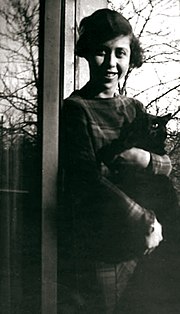Irène Némirovsky
| Irène Némirovsky | |
|---|---|

Irène Némirovsky, c. 1928
|
|
| Born | Irina Lvovna Nemirovskaya 11 February 1903 Kiev, Ukraine, Russian Empire |
| Died | 17 August 1942 (aged 39) Auschwitz-Birkenau, Nazi Germany |
| Occupation | Novelist |
| Literary movement | Modernism, |
| Notable works | Suite française |
| Spouse | Michel Epstein (2 children) |
Irène Némirovsky (French: [iʁɛn nemiʁɔfski]; 24 February 1903 – 17 August 1942) was a novelist of Ukrainian Jewish origin born in Kiev Ukraine under the Russian Empire; she lived more than half her life in France and wrote in French, but was denied French citizenship. Arrested as a Jew under the racial laws – which did not take into account her conversion to Roman Catholicism – she died at Auschwitz at the age of 39. Successful in her day, she is now best known for the posthumously published Suite française.
Némirovsky was born Irina Lvivna Nemirovska (Ukrainian: Іри́на Львівна Неми́ровська) in 1903 in Kiev, Ukraine, then in the Russian Empire, the daughter of banker Léon (Lev) Némirovsky. Her volatile and unhappy relationship with her mother became the heart of many of her novels.
Her family fled the Russian Empire at the start of the Russian Revolution in 1917, spending a year in Finland in 1918 and then settling in Paris, where Némirovsky attended the Sorbonne and began writing when she was 18 years old.
In 1926, Némirovsky married Michel Epstein, a banker, and had two daughters: Denise, born in 1929; and Élisabeth, in 1937.
In 1929, she published David Golder, the story of a Jewish banker unable to please his troubled daughter, which was an immediate success, and was adapted to the big screen by Julien Duvivier in 1930, with Harry Baur as David Golder. In 1930 her novel Le Bal, the story of a mistreated daughter and the revenge of a teenager, became a play and a movie.
...
Wikipedia
